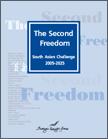Rights, Accountability and the Magna Carta
|
|
September 29, 2015
By
|
This year, the world celebrates the 800th year of the Magna Carta. Signed by King John in Runnymede in June 1215, the Magna Carta (meaning the Great Charter in Latin) was meant to be a contract in which King John bound himself to its provisions. That the king is under the law was a revolutionary idea in 1215. The Magna Carta is just as relevant today and will remain relevant as long as the rule of law prevails. One of the main elements of the rule of law is the understanding that the government, its officials as well as the keepers of law are all under the law. Even though the Magna Carta is one of the most celebrated documents in history because of its relevance to the rule of law, it is probably also responsible for the first codification of a human right by providing the first basis of a ���rights-based��� approach to justice.
Article 40 of the Charter stated for the first time in human history, ���To no one will we sell, to no one will we refuse or delay right or justice���. It is really the translation of this core idea that we see in most constitutions around the world guaranteeing a person the right to life and liberty. 18th century philosophers propounding individualism and reason as the basis of the inalienability of rights didn���t surface until the 1600s. The French and American Revolutions, heralding the principles that surfaced in the Age of Enlightenment, translated into legal guarantees of individual rights in the form of the Declaration of the Rights of Man and of the Citizen and the Bill of Rights respectively. However, it was really the Magna Carta that sowed the first seed in the 1200s.
The Magna Carta did two things ��� it bound the king to the law (accountability) and gave rights to people. The rights-based approach has been applied extensively through the years encompassing even economic development and environmental protection. Rights are the tools that facilitate the establishment of peace through justice. Since the 1700s, the wider idea of human rights has been narrowed down to specific rights such as women���s rights, child rights, indigenous rights, rights of people with disabilities etc. Apart from defining ���whose rights?���, the international community has also succeeded in defining and further codifying the ���right to what?��� such as right to development, right to education, right to clean air and water, right to practice one���s own religion, right to not practice a religion and so on.
It is unclear whether with the increase in the number of rights and right-bearers, accountability has also grown. James Madison, the great political theorist, in the Federalist Paper published in 1788 said,
���If men were angels, no government would be necessary. In framing a government which is to be administered by men over men, the great difficulty lies in this: you must first enable the government to control the governed; and in the next place oblige it to control itself.���
While there is no doubt that governments control the governed (including the act of offering rights to the governed), how it effectively controls itself and how it controls those who control factors of production is in a severe grey area. The reason it is important to bring businesses under such discussions is because while human rights and their interaction with their kings and governments dates back to the 1200s, the industrial revolution started only in the 1700s. Neoliberal economics and the Wirtschaftswunder (the economic miracle) propagating free-trade took centre-stage only after World War II. The divide in classes which has been growing steadily ever since were not addressed before their time. Further, we have been applying the same principles to the same actors i.e. the repressed and their representatives i.e. their governments. Accountability in fact, must apply to all those in power ��� military, regulatory, judicial as well as economic.
It can be surmised that the rise of institutional accountability has not been as extensive or rigorous as the rise in ���rights���. As an example, so far, economic accountability has been synonymous with business responsibility which is largely in the purview of Corporate Social Responsibility (CSR). CSR, while better than nothing, is voluntary and lacks strict enforceability. So no wonder that in famous oil-spill cases such as Exxon Valdez in 1989 and then again in the Deepwater Horizon in 2010, most of the externalities created by the accidents were absorbed by the environment itself. While individual parties affected by the oil spills could file cases against the companies because of the infringements of their ���rights���, other longer-lasting consequences of the oil spills were unchecked because of the lack of strict legal economic accountability.
Going back to the Magna Carta, the Charter provided rights to people while simultaneously enforcing the rule of law. Extending one without strengthening the other makes a frail system which is unable to adapt to changing circumstances. Accountability of businesses and governmental policies dealing with businesses must be as clearly defined and vibrantly discussed as rights have been. Unless the two work proportionally and in tandem, mankind will not be able to achieve the goals the Magna Carta set out to achieve 800 years ago.
Related Publications
-
.jpg&maxw=50)
Big Questions of Our time: The World Speaks, 2016
Download:Big Questions of Our time: The World Speaks _Full Report
-

-

Second Freedom South Asian Challenge 2005-2025, 2005
read more
Download:Second Freedom South Asian Challenge 2005-2025 Full Report
Related latest News
Related Conferences Reports
-

Global Challenges Conference, October 2016
Download:Global Challenges Conference Report
-

Conference on Responsibility to the Future: Business, Peace and Sustainability, June, 2008
Download:Global Security and Economy: Emerging Issues


